

Seven Lessons from Bob Nelson's NEBRASKA Screenplay
March 16th, 2014
The Oscar nominated movie NEBRASKA, with an award winning screenplay by Bob Nelson, is in my opinion one of the better scripts recently produced for screenwriters to learn a little something about the craft.
Why? It’s the epitome of efficient and dramatic storytelling. The script is pithy, direct, yet it has depth and emotion (theme) that is so subtle in its presentation. Also, fitting with today’s hard economic times, the story offers social commentary that is timely and clearly in the neorealist wheelhouse. A lot of people will relate and connect with this story and the characters that occupy it.
The story starts off with WOODY (70s) walking out of town, seemingly aimless and confused. Yet that is hardly the circumstance. Though Woody is presented as a drunk with a befuddled memory and bad hearing, he is really a focused and unwavering dreamer hoping for one last chance at making things right.
While walking out of town a police car stops and takes Woody to the station, most likely for public intoxication. His forty-something year old son DAVID is called to come and get the old man. When asked what he is doing, Woody tells his son he’s going to Nebraska to collect his sweepstake's winnings.
Here’s that scene from the script:
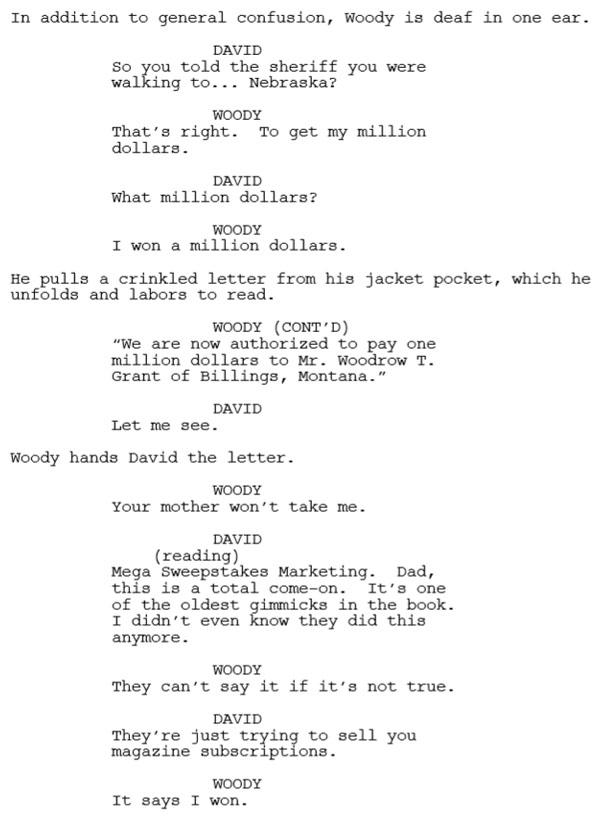
Screenwriting lesson number one, get into your story as quickly as possible. This is page four and Nelson is getting into the plot without delay. This will be the focus of the entire second act and the driving force of the narrative. What I call the “Narrative Trajectory” will be all about Woody’s quest for his $1 million dollars (and his stolen compressor.)
[Take a class from Chris: CLICK HERE for more info.]
Here's the video:
When asked what he’d do with the money, his only answer is to “buy a new truck.” Even though the plot is simplistic in nature, it’s an effective driving force for the narrative trajectory. The trick will be the writer’s ability to make the story multifaceted enough to keep our attention.
But there is more to this journey than just getting his prize, his new truck, and recovering a stolen air compressor; which is the subtle beauty of the writing. The writing beautifully captures the spirit of the characters and the journey becomes more about them than the million dollars.
Woody’s wife KATE offers some comedic moments but also a pessimistic narrative concerning her husband. David, Kate and his brother all try to tell Woody that there is no money; he’s chasing a pipe dream, a scam. Of course they are right, but that’s not the point.
Woody’s persistence triggers the call to action and David decides to take his father to Nebraska so he can find out there is no million dollars. Though, as mentioned, the journey will become about much more than simply shutting his dad up.
Here's the scene where Woody asks his son for help:
So David packs the car, gets his dad, and they are off:
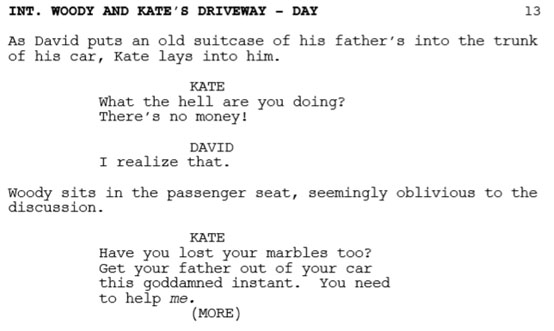
They head out on their journey on page 12; I’ve seen scripts that take until page 40 to get to the journey, the inciting incident. Not that you can’t do that, I just strongly urge you to get into your story decisively and quickly (lesson two). So, getting to the inciting incident economically and efficiently, taking the story in a new direction thus triggering the second act and its narrative trajectory.
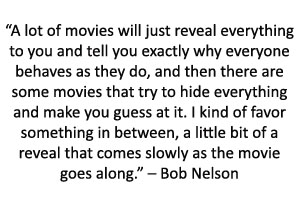 During the journey you place challenges and roadblocks in our heroes’ way (lesson three), and how your central character(s) deal with and overcome these obstacles reveals character and allows for story maturation. Within these active beats of the story, one about ever 10-15 pages, you get a chance to express character in the spaces between. (Note: not suggesting that you have to have a page count system – you know every 10 pages and a whamo. But there has to be plot developments, action, otherwise you’re not writing very effectively.)
During the journey you place challenges and roadblocks in our heroes’ way (lesson three), and how your central character(s) deal with and overcome these obstacles reveals character and allows for story maturation. Within these active beats of the story, one about ever 10-15 pages, you get a chance to express character in the spaces between. (Note: not suggesting that you have to have a page count system – you know every 10 pages and a whamo. But there has to be plot developments, action, otherwise you’re not writing very effectively.)
I might be making it sound too easy, that Nelson wrote a script by the book and therefore you can as well and sell your work. It’s not that easy. The writing to pull this story off has to be delicate and precise. Nelson’s writing is intricate.
Also, Nelson takes some chances with his story (lesson four). There is no true antagonist. The force(s) of resistance are multiple and not focused on one specific thing. The antagonistic force is really what the theme was about for me. Woody sets out on this journey for more than just money, its redemption perhaps. He has regrets and wants to set things right. The obstacles are the people around him who either are non-believers or want something from him. As we know in life, those two things can offer daily struggles for us all.
His son David joins him on his journey at first just to shut the old man up, but then learns more about his father than he ever knew. I am not going to go into all these nuisances as I want you to read the screenplay, see the movie, and let it come to you. Let the movie be about something that you’re not told by me or anyone else. See, a good screenplay (hence movie) with a deep resonating thematic vibe can be about many different things, depending on the person watching.
We bring something with us to each movie we see. A piece of us is often projected by us, during a good story like NEBRASKA, into the story and we become engaged with the narrative on a completely different level… when the writing is good. (Lesson five)
At page 70, as we’re closing in on the end of the third act or whatever act you want to call it, there’s a moment that really resonated with me. David asks his father if he could, would he do all over again:
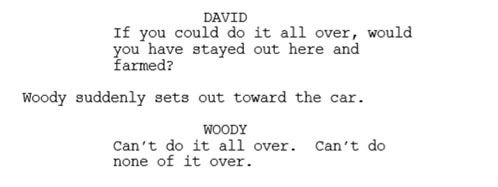
When we get right down to it, the journey for Woody and David wasn’t what we thought it was when it began. Lesson number six, there should be change occurring within our characters. There usually is a transformation that occurs. (Now I say usually there is a transformation, but this is not a rule, as there are some great scripts where there isn’t a true transformation.)
For Woody, we learn his goal was to try and change the course of his life; to do something for his family:
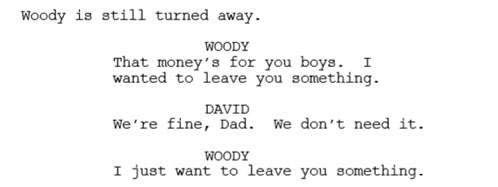
So what maybe started out for us as an audience was this old man and his cockeyed determination to take his family on yet another crazy trip, it turns into something else.
The ending (as I mentioned here) is not as nihilistic as could have been. Though Woody doesn’t get his million dollars (we knew this would not happen), what he does get is something far more valuable in return.
The ending is touching. David realizes that his father also wanted something else besides leaving a fortune behind for his family. He wanted to show his hometown that he wasn’t the gullible loser they had come to know. He wanted desperately to drive down Main Street in his new truck.
Here’s the last scene from the last page and a half of the script:
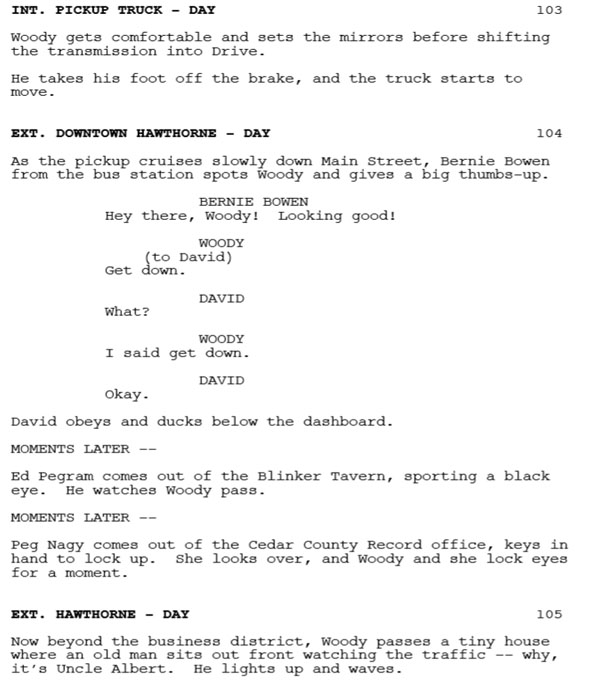
Endings are tricky, especially with a story like NEBRASKA. It could have ended lots of different ways. Picking your ending, choosing the right one that is truthful to the story is key (lesson seven). Nelson’s ending is subtle, with an uplifting spirit of redemption and discovery.
So as you can see, Bob Nelson’s screenplay NEBRASKA is a well written and successfully dramatic story and one that can teach all of us a little something about the craft of screenwriting.
[Take a class from Chris: CLICK HERE for more info.]
About the Author
Take Chris' Class: Writing Screenplays Hollywood Wants. 12 tutorials, downloads, materials, 1.5 hours of video instruction, and a weekly interactive video Q & A. All for just $19.95!
(Follow on Twitter) Christopher Wehner is a published author and produced screenwriter, EL CAMINO CHRISTMAS @Netflix and AMERICAN DREAMER (later this year); visit his IMDB page for future projects. Christopher has been a leading member of the online screenwriter's community going back to the 1990s. In 2001 he published the groundbreaking book Screenwriting on the Internet: Researching, Writing and Selling Your Script on the Web,.
To contact Chris visit his website: Warm Beer Productions.
More recent articles in Script Reviews
Only logged-in members can comment. You can log in or join today for free!
Advertisement








